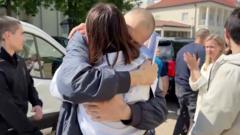In a surprising diplomatic move, the husband of prominent Belarusian opposition figure Svetlana Tikhanovskaya, Sergei Tikhanovsky, has been released from prison along with 13 other political dissidents. After five years of incarceration, Tikhanovsky was moved to Lithuania where he was joyfully reunited with Tikhanovskaya, who has been living in exile. The news arrived as US envoy Keith Kellogg visited Minsk and met with Belarusian President Alexander Lukashenko, leading to speculation about the implications of this release for both Belarus's political landscape and international relations.
Belarusian Opposition Leader's Husband Released: A Shock Resurgence of Hope

Belarusian Opposition Leader's Husband Released: A Shock Resurgence of Hope
Sergei Tikhanovsky, husband of Belarusian opposition leader Svetlana Tikhanovskaya, is free after five years, alongside 13 other political prisoners, raising questions about the future of Belarusian dissent.
The unexpected release, announced by Tikhanovskaya through a touching video of their first embrace since 2020, highlights the ongoing tension within Belarus following the controversial elections of 2020. Tikhanovsky's activism had made him a well-known figure prior to his detention, where he was convicted on dubious charges of inciting mass protests against Lukashenko. Tikhanovskaya stepped into the political arena in her husband’s absence and garnered significant support during the contentious elections that led to widespread protests, which were met with violent repression by government forces.
While the release of Tikhanovsky marks a notable moment in the struggle against Lukashenko's authoritarian regime, discussions surrounding the situation of other political prisoners and the overall climate of repression continue. With approximately 1,150 political prisoners still incarcerated, and the brutal crackdown on dissent still ongoing, many activists remain wary. As Tikhanovsky re-enters the political sphere, uncertainty looms over the dynamics of the Belarusian opposition, posing challenges for Tikhanovskaya's leadership.
Despite the recent positive developments, observers note that the release could be part of a calculated geopolitical strategy by Lukashenko, seeking to alleviate his international isolation in the wake of Belarus's alliance with Russia during the Ukraine conflict. For the time being, hope resurfaces for Belarus's political landscape as families are reunited and the international community weighs in on the future of the nation's political dissent.
While the release of Tikhanovsky marks a notable moment in the struggle against Lukashenko's authoritarian regime, discussions surrounding the situation of other political prisoners and the overall climate of repression continue. With approximately 1,150 political prisoners still incarcerated, and the brutal crackdown on dissent still ongoing, many activists remain wary. As Tikhanovsky re-enters the political sphere, uncertainty looms over the dynamics of the Belarusian opposition, posing challenges for Tikhanovskaya's leadership.
Despite the recent positive developments, observers note that the release could be part of a calculated geopolitical strategy by Lukashenko, seeking to alleviate his international isolation in the wake of Belarus's alliance with Russia during the Ukraine conflict. For the time being, hope resurfaces for Belarus's political landscape as families are reunited and the international community weighs in on the future of the nation's political dissent.


















